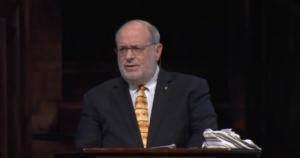Brian Chilton | January 31, 2017
Recently, I posted an article discussing the exclusivity of Christ. Among the difficult doctrines of the faith, the exclusivity of Christ is perhaps the most inconvenient due to its implications. In popular society, it is not polite to say that only one view is correct. When a person says that Christ is the exclusive way to heaven, one is making the perceived ostentatious view that only one worldview is correct and all others are false. Individuals promoting tolerance are appalled at such a notion. Yet, one must ask, is it true?
The article titled “Is Jesus the Exclusive Way to Heaven” here at BellatorChristi.com discusses the issue and answers that Jesus can only be the exclusive way to heaven. However, such a notion brings us another question, what about those who have never heard the gospel message? What of them? This article will provide a means to answer the question in three ways.
- Some revelation is available to everyone.
To a degree, some of God’s revelation[1] is known to all. This revelation is seen in creation. Theologians call this “natural theology” or “natural revelation.” Geisler defines natural theology (or revelation) as “the study of God based on what one can know from nature.”[2]Natural revelation is what helped David declare that the “heavens declare the glory of God” (Psalm 19:1).[3] Paul notes that “what can be known about God is plain to them, because God has shown it to them. For his invisible attributes, namely, his eternal power and divine nature, have been clearly perceived, ever since the creation of the world, in the things that have been made” (Romans 1:19-20). So, in a sense, everyone has a bit of God’s revelation. However, special revelation is a bit different. Special revelation is the specific revelation concerning the Gospel message. What about special revelation?
- Special revelation is revealed to the elect.
When we mention the term “election”[4] or “elect,” all sorts of theological dissension and division begins to emerge. However, such should not be the case. For our purposes, we will not get into the heated divisions of election.[5] Election is simply defined as “an act of God before creation in which he chooses some people to be saved, not on account of any foreseen merit in them, but only because of his sovereign good pleasure.”[6] As we discuss this aspect, several points must be noted:
1) It is not the will of God that any should perish (2 Peter 3:9).
2) Salvation was given so that the world could be saved (John 3:16).
3) Salvation was given so that the elect would be saved (Romans 8:29).
So, who are the elect?
- The elect are those who will respond to the gospel.
Paul describes the elect of God as those whom God “foreknew he also predestined to be conformed to the image of his Son, in order that he might be the firstborn among man brothers. And those whom he predestined he also called, and those whom he called he also justified, and those whom he justified he also glorified” (Romans 8:29). Thus, the elect are those who will respond to the gospel message. Those who are not elect will refuse the gospel message no matter how it is presented. This is known by God’s complete knowledge of past, present, and future events. So, how does this come together?
- God will provide the means necessary to save those whom God knows will be saved.
The wonderful truth through this exposition is that there will not be anyone who is not saved who would otherwise be saved. God created the best of possible worlds so that the most people could be saved. Thomists would argue that God knows this through his complete natural knowledge—things that could happen—and his free knowledge–things that will happen. Molinists and Congruists add middle knowledge to the foray, claiming that God knows what people would do in each circumstance. So, God completely knows the heart, mind, will, and emotions, of each person. God knows each possibility and the outcome to each possibility. God will ensure that every person who would respond to the gospel will respond to the gospel.
Conclusion
The point of this article is to show that God makes no mistakes. Everyone who would respond to the gospel will respond to the gospel. The one who objects to the exclusivity of Christ does so on the presupposition that other individuals get a foul deal. However, when we understand the complete knowledge of God, we come to understand that God places us at certain periods of time, among certain people, and in certain places for a reason. Nothing is by chance.

Let me close with one additional point. We do not know the extent by which the Holy Spirit reaches people. Missionaries have traveled to lands that open their doors for the first time only to find groups of underground Christians already present.[7] At the 2016 National Conference on Christian Apologetics, Dr. Barry Leventhal shared the story of one Joseph Hershkowitz. Joseph was a Jewish man who found himself in a Nazi concentration camp. Joseph found that he gained great hatred for his fellow Lutheran friends due to their negligence to stand opposed to the Nazi regime. While in the camp, Joseph made a vow that he would survive so that he could make the Christians of his time feel the same pain that his fellow countrymen were suffering. One particular day, Joseph was overwhelmed by the amount of suffering and executions surrounding him. Joseph wanted to sleep to never again awaken. That is when something tremendous happened!
Jesus appeared to Joseph in a vision. This Mystery Messiah led him to salvation. Joseph’s hatred was replaced by newfound joy! He wanted to tell others in the camp about this Mystery Messiah. However, he dared not do so because the only thing the people in the camp held was their friendship. Over time, however, he began to hear others who shared the same experience. This Mystery Messiah saved individuals in ways that no one could have otherwise imagined.
As we hear stories of people across the world having visions of Jesus and being led to salvation, I would not be a bit surprised if we come to find that there are many more people in exclusive lands that have heard the gospel that we simply do not fathom. We are called to share the gospel of Christ to every person we encounter. The Holy Spirit, however, is the One who truly saves. He will reach those whom are otherwise unreachable. Therefore, to answer our question, God reaches out to everyone but will ensure that everyone who will respond to the gospel hears the gospel.

Brian Chilton is the founder of BellatorChristi.com and is the host of The Bellator Christi Podcast. He received his M.Div. in Theology from Liberty University, his Bachelor of Science in Philosophy and Religious Studies from Gardner-Webb University, and received certification in Christian Apologetics from Biola University. Brian hopes to pursue doctoral studies soon. Brian is the pastor of Huntsville Baptist Church in Yadkinville, North Carolina.
Notes
[1] By revelation, I am speaking of God’s disclosure of information about himself to humanity.
[2] Norman L. Geisler, Baker Encyclopedia of Christian Apologetics, Baker Reference Library (Grand Rapids, MI: Baker Books, 1999), 521.
[3] Unless otherwise noted, all Scripture comes from the English Standard Version (Wheaton: Crossway, 2001, 2007).
[4] I will present a case for election upon which all major orthodox Christian theological systems would agree.
[5] Such is for another article.
[6] Wayne Grudem, Systematic Theology: An Introduction to Biblical Doctrine (Grand Rapids: Zondervan, 1994), 670.
[7] Some of these Christians follow Christ because of the power of God working through the radio waves.
© 2017. Bellator Christi.





